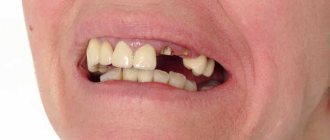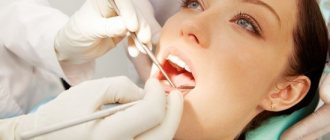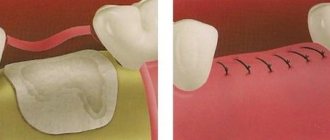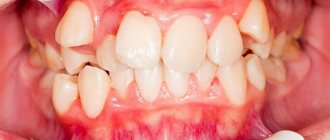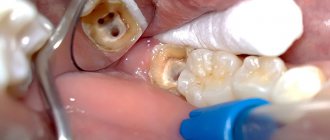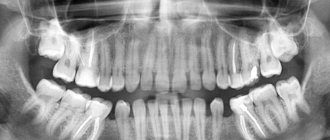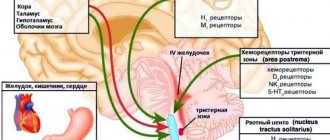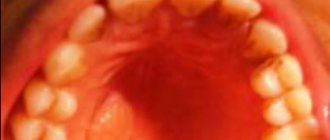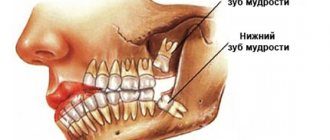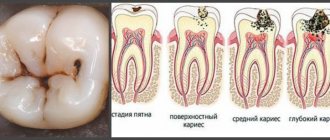Can Spazmalgon help with toothache?
Healthy teeth guarantee not only a beautiful smile and the absence of unpleasant sensations in the mouth.
They also determine a person’s overall well-being! With healthy teeth, you can forget about a lot of problems associated with other body systems. The reverse is also true. Bad teeth lead to many other problems. They affect general health, the condition of the gastrointestinal tract, respiratory system, and most importantly, the cardiovascular system. And, in particular, the condition of the teeth determines blood pressure. Every person experiences pain at least once in their life. The reasons for its occurrence may be different, but the feeling of pain makes it clear that something is wrong in the body. Therefore, you should not ignore the signs of pain and put off solving the problem indefinitely; it is better to immediately seek help from a doctor, this will allow you to determine the causes of the pain. But this does not mean that you need to endure until the doctor finds the problem.
There are a huge number of painkillers that will very quickly relieve the symptoms of pain, but today we will look in detail at the cases in which Spazmalgon helps.
The drug Spazmalgon has an antispasmodic and analgesic effect. After taking it, the smooth muscle tissues come to a relaxed state, due to which the painful sensation decreases and the spasm is relieved.
Teeth, as you know, consist of bone tissue. This raises the question: “Can the drug relieve toothache?”
Causes of pain in teeth:
- Destruction of tooth enamel. leading to caries.
- If caries has spread to the pulp (soft tissue of the tooth), which has led to the development of pulpitis.
- The occurrence of periodontitis is when the inflammatory process affects the tissue around the tooth.
Any of the listed reasons leads to pain, which is accompanied by pulsation or lumbago, radiating to the head and ear. By taking Spazmalgon as a pain reliever, you will relax muscle tissue, which will block painful impulses, which will lead to relief from tooth pain.
With a strong inflammatory process that continues to develop, the use of Spazmalgon may give a less noticeable effect, so you should immediately see a dentist.
The drug is released in the form:
- white, round tablets;
- solution for injection.
Spazmalgon is recommended to be taken for moderate pain. which can be caused by various factors.
In what cases can Spazmolgon be used:
- During menstruation. The drug is used for pain relief in the form of tablets. Two tablets per day are enough to relieve pain, but the interval between doses should not be less than 4 hours.
- Diseases of the stomach and intestines. Spasmalgon is an excellent remedy for eliminating pain in the stomach and intestines, since spasm of smooth muscles goes away after taking the medicine. The product also effectively relieves pain in ailments such as urolithiasis and exacerbation of biliary dyskinesia.
- Diseases of the genitourinary system and cystitis. The medicine contains fenpiverinium bromide, which helps reduce pain during inflammatory processes of the genitourinary system.
- Problems of the musculoskeletal system. For diseases such as arthrosis, neuralgia, osteochondrosis and others, it is recommended to use the drug intramuscularly, but the medicine should not be used for more than three days in a row.
- Temperature increase. Spasmolgon is able to normalize body temperature if its increase was caused by inflammation. If the temperature has increased due to a psychosomatic condition, such therapy will not give the expected effect.
The drug should be taken for no more than three days; in all other cases, a doctor’s consultation is necessary.
The daily dosage of the tableted form of the drug should be as follows:
- For adults, you can take 1-2 tablets at a time, but not more than 6 tablets.
- Adolescent children (12–15 years old) can take 1 tablet at a time. The norm is 3–4 tablets, in rare cases 6 pieces are allowed.
- Children aged 8–11 years can take 0.5 tablets per dose, but no more than 4 tablets. in a day.
- At 5–7 years old, children can take 0.5 tablets, but no more than 2 tablets per day.
It is very important to remember that the interval between doses of the drug should not be less than 4 hours. The tablet does not need to be crushed or chewed; it is swallowed with plenty of water.
Toothache and pressure
Healthy teeth guarantee not only a beautiful smile and the absence of unpleasant sensations in the mouth. They also determine a person’s overall well-being! With healthy teeth, you can forget about a lot of problems associated with other body systems. The reverse is also true. Bad teeth lead to many other problems. They affect general health, the condition of the gastrointestinal tract, respiratory system, and most importantly, the cardiovascular system. And, in particular, the condition of the teeth determines blood pressure.
Evidence from Swedish scientists
In the past decade, scientists from the Swedish University of Gothenburg conducted a study designed to confirm or refute the relationship between dental health and overall health of the body. More than 200 respondents of various genders and ages took part in it. The researchers studied general health indicators - the dynamics of blood pressure, heart rate, cholesterol and blood sugar levels.
At the beginning of the study, dentists determined, based on their examinations, that a dozen respondents had a high risk of developing cardiovascular disease within 10 years. And subsequently, half of these participants were prescribed blood pressure medications. As a result, teeth really affect the state of the cardiovascular system.
Symptoms of toothache
Symptoms accompanying toothache can help determine the cause of the pain:
- If it is pulpitis, the pain occurs during meals and intensifies at night. It radiates from the tooth to the temple or ear area. It hurts very much, it is difficult to endure for a long time.
- If it is periodontitis, due to the decay of the pulp and damage to the ligamentous apparatus, the pain becomes more intense.
- If it is periodontitis, the tissues around the affected tooth become inflamed and the tooth becomes loose. The pain is intense, sharp, aching.
- If it is gumboil - very swollen gums, the temperature may rise. It's hard to open your mouth and it hurts to eat.
- Brush your teeth thoroughly;
- rinse your mouth with warm, slightly above room temperature, water (never hot);
- take a pain reliever, for example, Ketanov or Ibuprofen;
- do not exceed the maximum permissible doses of drugs;
- A massage can help with toothache (massage the hollow between the lip and nose);
- folk remedies can help for a short time: plantain applied to the tooth or cheek;
- garlic in a cavity affected by caries;
- ice on the outside of the cheek will relieve swelling;
- propolis tincture with 30% alcohol content acts as an anesthetic;
Do not heat, rub, or apply anything hot to the sore spot - a severe inflammatory process may develop. This will make the pain worse.
If your child is unwell, you can only give him children’s medications so as not to harm him. In this case, it is also very important to observe the dose. And in order for dental diseases to bother you as little as possible, you need to regularly visit the dentist and check the condition of the oral cavity - at least once a year, but the optimal norm is 6 months.
- If it is pulpitis, the pain occurs during meals and intensifies at night. It radiates from the tooth to the temple or ear area. It hurts very much, it is difficult to endure for a long time.
- If it is periodontitis, due to the decay of the pulp and damage to the ligamentous apparatus, the pain becomes more intense.
- If it is periodontitis, the tissues around the affected tooth become inflamed and the tooth becomes loose. The pain is intense, sharp, aching.
- If it is gumboil - very swollen gums, the temperature may rise. It's hard to open your mouth and it hurts to eat.
- Gently brush your teeth with warm water.
- Do not exceed the dose of painkillers.
- Apply ice to your cheek if there is swelling.
- Apply a suture if a bone formation is removed.
Do not heat, rub, or apply anything hot to the sore spot - a severe inflammatory process may develop. This will increase the pain. If the child is unwell, you can only give him children’s medications so as not to harm him. In this case, it is also very important to observe the dose. And in order for dental diseases to bother you as little as possible, you need to regularly visit the dentist and check the condition of the oral cavity - at least once a year, but the optimal norm is 6 months.
When removing teeth, the patient must warn the doctor about cases of heart attack or stroke.
To relieve discomfort, a person should use an ice compress. To prevent the inflammatory process from developing, one should not heat the oral cavity or rub the sore spot. This does not stop hurting, the pain only gets worse. An increase in blood pressure can be stopped by following the following recommendations from doctors:
We suggest you read: Can the upper teeth come out first - Infant
If the pain is not severe, Analgin will help, they also take Paracetamol. People suffering from hypertension should definitely take blood pressure medications before visiting the dentist. Painkillers are the best remedy if your tooth hurts. They are usually used as first aid to relieve pain.
However, the choice and dosage of remedies for toothache depends on the exact cause of its occurrence, which only a doctor can determine. He will provide effective pain relief and properly treat the affected area. Self-medication often leads to a significant increase in blood pressure, disruption of the vascular system and heart, as well as other negative consequences.
Symptoms accompanying toothache can help determine the cause of the pain: Enter your pressure Move the sliders 120 to 80
Before starting treatment and even examination, dentists ask their patients a number of standard questions: are they allergic to medications, what are the concomitant diseases. Doctors are especially interested in the presence of hypertension. If the pressure is elevated, then any treatment of caries and its complications, as well as tooth extraction, will have its own characteristics, which relate to anesthesia and further rehabilitation.
With prolonged existence of hypertension, single blisters may appear on the palate and mucous membrane of the tongue, containing bloody contents. In medicine, this condition is called “vesical syndrome.” The blisters located under the mucous membrane can maintain their integrity from several hours to 1-2 days.
After opening them, an eroded surface remains, bringing a lot of inconvenience and pain to the patient. The addition of bacterial flora can result in complications - bacterial inflammation. Even in the initial stages of the development of hypertension, the dentist may notice that the mucous membrane is pale, cyanotic, and the papillae of the tongue change.
Patients may complain of burning, cracked lips. Also, for patients with hypertension, periodontal diseases are detected in 91% of cases: gingivitis, periodontitis, and periodontal disease is diagnosed in 11% of patients. Therefore, hypertension is a risk factor for the development of serious periodontal diseases.
adrenaline, norepinephrine. All doctors' concerns are related to the fact that vasoconstrictors can increase blood pressure, which in case of hypertension is dangerous by the development of a hypertensive crisis. Therefore, for local anesthesia, it is recommended to use anesthetics with minimal doses of vasoconstrictors.
The drug Mepivakin, which has a vasodilating effect, has become popular among dentists, so it does not require additional administration of a vasoconstrictor. When Bupivacaine is administered, anesthesia lasts for a long time, and therefore it is considered one of the most powerful anesthetics. Anesthesia, its characteristics, and the choice of drug depend on the stage of hypertension.
Surgical treatment for hypertension is often carried out as planned, with preliminary preparation and mandatory premedication. Dentists determine the maximum values and pressure numbers that are “working.” Before anesthesia, the level of blood pressure is determined, which should always be monitored.
If the usual pressure figures are recorded, then doctors strive for an even greater reduction, after which they perform a surgical operation. Premedication is carried out under strict control of blood pressure, and antihypertensive drugs are included in its regimen. If patients have recorded elevated blood pressure figures, then before direct treatment, even After administering anesthesia, doctors re-measure blood pressure, reduce it with medication and monitor its values throughout the procedure.
What to do?
- Brush your teeth thoroughly;
- rinse your mouth with warm, slightly above room temperature, water (never hot);
- take a pain reliever, for example, Ketanov or Ibuprofen;
- do not exceed the maximum permissible doses of drugs;
- A massage can help with toothache (massage the hollow between the lip and nose);
- folk remedies can help for a short time: plantain applied to the tooth or cheek;
- garlic in a cavity affected by caries;
- ice on the outside of the cheek will relieve swelling;
- propolis tincture with 30% alcohol content acts as an anesthetic;
We suggest you familiarize yourself with What you can do to prevent toothache
If your child is feeling unwell, you can only give him children’s medications so as not to harm him. In this case, it is also very important to observe the dose. And in order for dental diseases to bother you as little as possible, you need to regularly visit the dentist and check the condition of the oral cavity - at least once a year, but the optimal norm is 6 months.
The goal of first aid for dental pain is to alleviate suffering and create tolerable conditions for the patient before going to the dentist. And it is advisable to do this without serious health complications for the sake of five-minute relief. Therefore, it is worth knowing first of all what not to do.
Do not apply heat. If you suffer from acute toothache, it is not recommended to heat either the tooth itself or the cheek. Severe toothache indicates the presence of an inflammatory or infectious process. By applying warm compresses or using other heating methods, you stimulate blood flow to the pathological area. Instead of one diseased tooth, you can get a complication affecting the entire dentition.
If a tooth hurts, it is much more effective to replace warm compresses with briefly applied ice;
Use medications carefully. You cannot blindly believe everything that is written on the Internet. Severe toothache can be effectively relieved or alleviated only in a dental office. All other methods give only an insignificant short-term effect; you should not expect a miraculous cure from them.
Bed rest is not for you. If you are taken by surprise by an acute toothache, it is better to resist it on your feet or while sitting. The half-sitting position is the very compromise that will allow you to more comfortably endure an unpleasant and exhausting situation and will not cause even more harm to the aching tooth.
The fact is that when a person is in a horizontal position, the blood flow to the diseased tooth increases. Increased pressure is created around the already irritated nerve endings and severe toothache becomes simply unbearable. If an acute toothache catches you at night, place the pillows higher, lean back on them and try to take a nap in this position;
Hot rinses and folk remedies. Most ways to relieve tooth pain are based on traditional methods of treatment and pain relief. And the vast majority of recipes advise using hot rinses. You can't do this! But if you use these same herbal decoctions warm, the effect can be very positive, in extreme cases, harmless.
First aid for a toothache begins with identifying the causes of the discomfort and eliminating irritating factors. Toothache can be caused by various irritants:
- Hot or cold food and drinks;
- Cold air;
- Sweet, sour, salty foods and drinks;
- Pressure drop;
- Head position;
- By pressure or other influence;
- Food getting into the carious cavity;
- Other mechanical effects on the tooth.
As soon as it becomes clear why the tooth hurts at a particular moment, it is necessary to stop the irritating influence. After this, consult a doctor for help. If the appointment is postponed for a long time, then it is worth taking painkillers.
Copying site materials is possible without prior approval if you install an active indexed link to our site.
The information on the site is provided for general information purposes only. We recommend that you consult your doctor for further advice and treatment.
As soon as a person catches a cold, his general health worsens. Along with a runny nose and cough, a headache appears and the temperature rises. The body can react differently to the presence of infection. Some people have problems with bowel movements, while others experience tooth pain. The reasons for this vary, so it is difficult to identify the origin of toothaches without consulting a doctor.
A common “conductor” of a cold is toothache – a sign of infection.
To relieve discomfort, a person should use an ice compress.
To prevent the inflammatory process from developing, you should not heat the oral cavity or rub the sore spot. This does not stop hurting, the pain only gets worse. An increase in blood pressure can be stopped by following the following recommendations from doctors:
- Gently brush your teeth with warm water.
- Do not exceed the dose of painkillers.
- Apply ice to your cheek if there is swelling.
- Apply a suture if a bone formation is removed.
If the pain is not severe, Analgin will help, and Paracetamol is also taken. People suffering from hypertension should definitely take blood pressure medications before visiting the dentist. Painkillers are the best remedy if your tooth hurts. They are usually used as first aid to relieve pain.
However, the choice and dosage of remedies for toothache depends on the exact cause of its occurrence, which only a doctor can determine. He will provide effective pain relief and properly treat the affected area. Self-medication often leads to a significant increase in blood pressure, disruption of the vascular system and heart, as well as other negative consequences.
- Brush your teeth thoroughly;
- rinse your mouth with warm, slightly above room temperature, water (never hot);
- take a pain reliever, for example, Ketanov or Ibuprofen;
- do not exceed the maximum permissible doses of drugs;
- A massage can help with toothache (massage the hollow between the lip and nose);
- folk remedies can help for a short time: plantain applied to the tooth or cheek;
- garlic in a cavity affected by caries;
- ice on the outside of the cheek will relieve swelling;
- propolis tincture with 30% alcohol content acts as an anesthetic;
To relieve discomfort, a person should use an ice compress.
May be blood pressure from toothache
There are several factors through which teeth affect blood pressure. And first of all, long-term, exhausting pain leads to the growth of the latter. When there is pain, the body “turns on” a protective reaction and begins to intensively produce the hormone adrenaline. Once in the blood, it causes an increase in heart rate and leads to an increase in blood pressure.
However, attempts to get rid of pain by taking appropriate medications also have an effect on the circulatory system. Most of these drugs also increase blood pressure. As a result, an avalanche-like increase in blood pressure is observed. And this is fraught not only with unpleasant sensations, but also with the need to visit a doctor.
However, even if the teeth do not hurt, but are damaged by various diseases, such as caries or periodontal disease, they still lead to an increase in blood pressure. The fact is that the destruction of bone tissue in most cases is caused by the activity of microorganisms, such as staphylococci and streptococci.
Once in the vessels, microorganisms begin to deposit on their inner walls, leading to the formation of blood clots. This, in turn, reduces the permeability of these “tubes”. And, consequently, the pressure is constantly growing.
There are several factors through which teeth affect blood pressure. And first of all, long-term, exhausting pain leads to the growth of the latter. When there is pain, the body “turns on” a protective reaction and begins to intensively produce the hormone adrenaline. Once in the blood, it causes an increase in heart rate and leads to an increase in blood pressure.
However, attempts to get rid of pain by taking appropriate medications also have an effect on the circulatory system. Most of these drugs also increase blood pressure. As a result, an avalanche-like increase in blood pressure is observed. And this is fraught not only with unpleasant sensations, but also with the need to visit a doctor.
However, even if the teeth do not hurt, but are damaged by various diseases, such as caries or periodontal disease, they still lead to an increase in blood pressure. The fact is that the destruction of bone tissue in most cases is caused by the activity of microorganisms, such as staphylococci and streptococci.
These harmful bacteria and viruses begin to spread throughout the body. With saliva they enter the gastrointestinal tract, with air into the respiratory apparatus, and through the blood capillaries in the gums into the cardiovascular system. Once in the vessels, microorganisms begin to deposit on their inner walls, leading to the appearance of blood clots. This, in turn, reduces the permeability of these “tubes”. And, consequently, the pressure is constantly growing.
Can there be increased pressure from teeth?
Author admin4ik Reading time 8 min. 10/23/2019
You will first need to take an x-ray. Anesthesia is then selected for the patient based on the clinical picture. A simple surgical procedure consists of 2 stages:
The procedure for simple wisdom tooth removal lasts 1-10 minutes and does not require cutting into the gums. The figure eight is not drilled out of bone tissue.
When the inflammatory process develops, the dentist washes the wound with an antiseptic solution. To prevent infection from entering the oral cavity, the patient is prescribed an anti-inflammatory device (“Alvogil”).
After administering the medication, the wound is sutured, which reduces the risk of bleeding.
After a complex wisdom tooth extraction, a re-examination is scheduled. This operation is performed in the following cases:
- the eight did not cut through;
- branched roots;
- destroyed crown.
To remove a tooth, you will need to cut the gum and suture the wound. In this case, the manipulation lasts 20-120 minutes. Any wisdom tooth removal will require special equipment and tools, including forceps, a bur, and an elevator.
High blood pressure in the treatment of toothache
The main reasons why blood pressure increases are severe toothache and darkness. At night, biorhythms work differently than during the day, and blood pressure tends to rise even in those people who usually do not experience problems with it. In the evening, unpleasant aching sensations appear, which become stronger closer to the night. A tooth can hurt so much that a person wakes up.
If the pressure rises, it is dangerous:
- bleeding from the nose;
- increased bleeding from the socket during tooth extraction;
- stroke;
- heart attack.
Hypertensive patients are required to use blood pressure medications when visiting the dentist.
Before visiting the dentist, hypertensive patients need to know some rules:
- If the patient has had a heart attack or stroke, be sure to warn the doctor about it.
- If you have hypertension, you need to take a drug that lowers your blood pressure. Firstly, anxiety can increase blood pressure. Secondly, most likely, you will need to have anesthesia, and drugs such as Ultracain contain adrenaline. You can ask for anesthesia without it, but it is weaker and takes less time to work.
- When a tooth cannot be saved and the only option is to remove it, the socket may bleed for a long time. Therefore, a suture should be placed on the wound. Hemostatic drugs in this case are ineffective.
We suggest you read: Can a cheek swell after tooth extraction?
No. 32 581 Dentist 05/09/2016 Some time ago, the filling of the upper molar broke, and there is no way to treat the tooth yet. Having suffered a toothache, I felt a heaviness in my head, I turned to a doctor, I work in transport, it showed high blood pressure - 185/105. Could a toothache cause such blood pressure?
Svetlana Nikolaevna, Novorossiysk Hello, I have been suffering from terrible headaches for two years. It all started suddenly, about three years ago, occasionally shooting in the back of the head, and not at all weakly. By the way, I never complained about my health before, I never took sick leave or asked for time off.
My overall health simply ended one day, abruptly and unexpectedly! I had a period in my life when I was very nervous, all the problems and hardships piled up in a few months. It all started with this: I went today to treat a tooth, changed the filling, the dentist gave three injections, when I gave the first one it hurt, at first it hurt, then half of my face froze.
When I arrived home, I saw that half of my face was swollen, the freezing went away after 5 hours, but the swelling remained. There is such a dense tumor on my cheek, it hurts, and there is an aching pain in the tooth that was treated. Why is my face swollen? How soon will it be? I have never encountered such a problem before, the doctor is young, works from home, I contacted her for the first time. Hello!
I caught a cold in September. After this, the head hurts in the parietal part. Feeling of heaviness, difficulty concentrating. The neurologist prescribed Cavinton tablets for 5 days. The pain has become less, but the feeling of heaviness in the head does not go away (as with a cold), the head feels like porridge. It’s hard for me to remember the digital values after a while.
Another neurologist prescribed a Mexidol drip. 300mg Na CL 0.9%-200. But I took half the dose. Suddenly my head became hot, there was a bright spot in front of my eyes and a current passed through my head. I had a severe headache on the right side, then pain in my teeth appeared. The lower right eyelid is swollen. Some ulcers appeared inside the mouth.
3 weeks ago there was a perforation of the eardrum, nothing was prescribed, the ear is blocked, I can’t hear, the ENT can’t see anything because of the swelling of the ear, there’s something jelly-like in the ear, what could it be? And he prescribed Vibrocil to drop into my ear, but it gives me terrible pain on the floor of my head and teeth, is it possible not to drop it? He prescribed antibiotic injections and otofu on the 8th day,
18 Online consultations are for informational purposes only and do not replace a face-to-face consultation with a doctor. User AgreementYour personal data is securely protected. Payments and site operation are carried out using the secure SSL protocol.
When a person experiences aching or throbbing pain in a tooth, which intensifies when biting, or when eating hot food, he is perplexed: after all, a pulpless (deprived of nerve) tooth should not hurt? It turns out, maybe, and in such a way that there is no strength enough to endure these torments. During such an exacerbation, patients feel that the tooth has grown - lengthened.
Often, with severe aching pain, swelling of the face occurs, the so-called gumboil. Local lymph nodes (under the jaw, behind the ear) on the affected side enlarge, become painful on palpation, and the temperature may rise to 37-37.5 C. Sometimes the patient complains of itching. The tooth may be mobile, and when you press on the gum next to the diseased tooth, pus may be released.
A fistula (whitish lump) may form on the gum near the aching tooth, from which the purulent contents of the cyst are released. Most often, after the process of freeing the site of inflammation from pus begins, the pain becomes less intense. The doctor makes a diagnosis of periodontitis. However, there are situations when patients have no complaints, and periodontitis is discovered by chance at an appointment with a therapist while replacing a filling or restoring a damaged tooth.
Complications are possible in the form of a perimaxillary abscess, osteomyelitis of the jaw. There are several reasons for periodontitis. The main reason for the development of this disease is poorly treated tooth canals during the treatment of pulpitis or a complication of caries, when the infection penetrates the tooth canals and spreads to the periodontium, damaging it.
However, it often develops against the background of well-treated root canals due to heavy load on the tooth, trauma, allergic reaction to medications, toxins... Inflammation of the gums can also provoke the development of periodontitis. Periodontal inflammation is the result of exposure to microorganisms, or more precisely, toxins that they produce during their vital activity and during the decay of pulp and periodontal tissue.
First aid
With periodontitis, the inflammatory focus is localized in the area of the apex of the tooth root (in the jaw bone). Increased pressure occurs at the site of inflammation - this is what causes severe pain when pressing on the tooth. To reduce pain, it is necessary to reduce this pressure and create an outflow of contents from the inflammatory focus.
To do this, you need to rinse your mouth with a solution of table soda (1 teaspoon of soda per glass of very warm water). The more often, the greater the chance that the outflow of purulent contents will begin. Heat should not be applied to the sore spot. Until this happens, you can take analgesics (Ketanov, ibuprofen) to relieve pain.
Diagnostics
At the appointment, the dentist-therapist listens to the patient’s complaints, conducts an intraoral examination and refers the patient for an x-ray examination. Most often, a targeted x-ray is sufficient to clarify the diagnosis, but an orthopantomogram may also be required. If necessary, the doctor may refer the patient for a dental CT scan.
An X-ray examination of periodontitis reveals changes in the tissues surrounding the tooth root: expansion of the periodontal fissure (the space between the bone and the tooth root), the presence of cystic formations, granulomas (the formation of a connective tissue capsule filled with granulations.) A radical method of combating periodontitis is tooth extraction, and it and the source of inflammation - cysts.
But many, naturally, are in no hurry to get rid of it, but ask to be “cured.” Whether conservative treatment makes sense is determined based on the radiograph. With its help, the doctor determines whether the root canal has been filled, what size the “cyst” reaches, and how damaged the tooth is. If it turns out that treatment is advisable, the patient must be warned that it consists of several stages and can last for 2 - 3 months, so it is worth being patient and strengthening the immune system, since the dentist only helps the body eliminate inflammation, mainly with the pathological process The body copes on its own.
During the treatment, the doctor removes the infected tissue that has filled the root canal and thoroughly cleans it using modern, durable, flexible and very thin instruments and technology. If the canal was sealed a long time ago using old technology, it is difficult to unseal it, reach the source of inflammation and eliminate it using conventional instruments.
In such situations, a special apparatus is used to carry out the depophoresis procedure. This is one of the methods of physiotherapy, it consists in the fact that with the help of a small current, ions of the medicinal substance permeate the entire root tissue and affect the granuloma. A special medicinal paste containing calcium is temporarily placed in the cleaned canal.
Thanks to the action of the paste, the acidic environment created by microorganisms is neutralized due to the alkaline properties of calcium. Sometimes the composition of such preparations (pastes) includes iodine derivatives, and in the case of an acute process or exacerbation, after creating an outflow of contents from the site of inflammation, “intraradicular medicinal preparations” containing antibiotics are used.
We suggest you read: A tooth was not completely removed, what to do?
When the condition has stabilized, endodontic treatment is carried out under X-ray control. Only after this the canal is processed again and filled very tightly. In the treatment of periodontitis there is always a risk of not getting the desired result, therefore, as a rule, it is carried out without a guarantee. Very large cysts are more difficult to treat and its success is less likely.
And if the crown part of the tooth is so destroyed that it can no longer be restored, it makes sense to remove the tooth. In some cases, and they are becoming less common, the patient’s root canal is filled with Soviet cement. It is impossible to unseal and completely process it, to reach the source of inflammation and eliminate it; the tooth also has to be removed.
In the case where a cyst (granuloma) has formed in the area of the apex of the tooth root, but it does not respond to conservative treatment, the tooth can be saved using tooth-preserving surgical treatment. Coronal-radicular separation allows you to cut the tooth crown into two parts at the place where the roots diverge, so thus, giving the surgeon the opportunity to clean out the granulation tissue through the resulting gap.
This operation is carried out, as a rule, on large chewing teeth - molars, and is sometimes called premolarization, since as a result the molar turns into two premolars. Hemisection is an operation in which one of the roots is cut off and removed along with the part of the tooth adjacent to it. Recommended mainly for chewing teeth of the lower jaw.
Amputation is the cutting off of an entire tooth root at its origin, without compromising the integrity of the crown part of the tooth. It is used on teeth with several roots, mainly on the molars of the lower jaw, sometimes on the premolars of the upper jaw. Resection of the apex of the tooth is the most commonly used operation for periodontitis.
During it, the tip of the tooth root is cut off, the cyst is removed, and the periodontium is cleared of pathological tissue. If necessary, retrograde filling is carried out - the canal is filled from the end, then bone-forming material is laid and a suture is applied. The use of these techniques allows doctors to preserve teeth, which just a few years ago everyone, even young people, had to part with.
Prevention
High blood pressure and a visit to the dentist
https://www.youtube.com/watch?v=TRleY2tQ2rg
As is known, chronic diseases of various organs and systems often worsen in the autumn-spring period. This is due to many factors leading to decreased immunity, such as:
- constant changes in weather conditions (either rain or sun) leads to hypothermia.
— change in atmospheric pressure.
— the human body is reconstructed from the summer to the winter period, completely different biochemical processes come into play.
- a not entirely rosy picture outside the window also does not help to lift your spirits, but on the contrary leads to despondency, which in turn leads to stress.
One of the first systems to fail is the cardiovascular system. Therefore, people suffering from high blood pressure should be on alert and resort to preventive measures.
In case of hypothermia, change of weather, stress, in addition to the cardiovascular system, nervous system and gastrointestinal tract, the dental and jaw system also suffers. Since a “dormant” infection in the bone (granuloma, cystogranuloma or cyst) with a decrease in immunity in the autumn-spring period also causes exacerbations (pulpitis, periodontitis or gum disease).
Therefore, if you suddenly have a toothache, people suffering from hypertension need to know a few rules before visiting the dentist:
1) If you have hypertension, you must take an antihypertensive drug before visiting the dentist. Because it may be necessary to administer anesthesia, and modern anesthetics used in dentistry contain adrenaline, which increases blood pressure. You can, of course, use an anesthetic without adrenaline, but it has a weaker analgesic effect.
2) People who have had a heart attack or stroke must inform the dentist about the illness before any manipulations.
3) If it is not possible to save the tooth (treat it therapeutically - remove the infection from the root canal of the tooth and behind the apex of the tooth) and have to remove it, then with high blood pressure, blood may flow from the socket for a long time, which will be difficult to stop with hemostatics (hemostatic drugs ). In this case, the hole must be sutured after removal, but only by a doctor.
At the end of this article, I would like to say that only timely prevention and early diagnosis of diseases contribute to speedy treatment and recovery without complications.
To prevent toothache, you need to visit the dentist once every six months. And then your smile will not leave anyone indifferent.
Share with your friends!
We wish you and your loved ones good health.
Features of tooth extraction for hypertension
It is self-evident that hypertensive patients and people with weather sensitivity need to pay special attention to the health of their teeth. Because changes and constant increases in pressure are especially dangerous for them. In addition, people who are at high risk of heart failure or other diseases of the main muscle should not delay visiting the dentist.
It is self-evident that hypertensive patients and people with weather sensitivity need to pay special attention to the health of their teeth. Because changes and constant increases in pressure are especially dangerous for them. In addition, people who are at high risk of heart failure or other diseases of the main muscle should not delay visiting the dentist.
For whom are bad teeth especially dangerous?
About the effect of diseased teeth on the heart
Many people know for themselves that bad teeth cause pain and other troubles. But not everyone is aware of the impact of teeth on heart health.
Prolonged, debilitating, intense toothache can cause nervous disorders, increased blood pressure, increased heart attacks in the form of compressive pain and/or various heart rhythm disturbances. Some pain medications have the side effect of increasing blood pressure.
Microbes that nest in diseased teeth are often streptococci. are a time bomb for the development of cardiovascular diseases such as rheumatism and infective endocarditis.
Rheumatism develops over the years, secretly, gradually destroying the heart valves, and manifests itself as severe heart failure. In this condition, the only way to prolong life is surgery on the heart valves.
With infective endocarditis, pus from rotten teeth enters the bloodstream and provokes inflammatory abscesses on intracardiac structures and the formation of intravascular blood clots. The disease completely eats up the heart valves in a matter of days or weeks in the absence of timely diagnosis and intensive treatment with massive doses of antibiotics.
The waste products of microbes, the so-called toxins, cause in people, when the body's defenses are weakened and the body is prone to allergic reactions, the development of infectious-allergic myocarditis and cardiomyopathy.
Myocarditis of moderate and severe severity is manifested by general malaise, weakness, discomfort in the heart area, various cardiac arrhythmias and requires additional examination and treatment by a cardiologist to avoid further complications.
Cardiomyopathies are asymptomatic for a long time, gradually leading to thickening or overstretching of the walls of the heart. Severe loss of cardiac muscle tone requires surgical intervention, including a heart transplant.
Doctors of the Ancient East said: A tooth is a lamp, the loss of which brings us ever closer to darkness. Therefore, it is so important for everyone to undergo a timely examination by a dentist and listen to their heart more often!
head medical prevention room,
doctor Shabardina S.V.
https://www.youtube.com/watch?v=uDswA0BZ1-I
Help for the patient depends on the cause of the painful condition. First of all, you need to exclude the presence of dangerous pathologies by undergoing an examination by a doctor.
First aid when teeth hurt due to a cold:
- Treating a runny nose should be the primary treatment for pain caused by increased sinus pressure. To do this, use various nasal drops and sprays. There are a large number of vasoconstrictor drugs, but with frequent use they only aggravate the patient’s condition. Mucolytic agents are also used to thin nasal secretions and promote their free outflow. For allergies, it is appropriate to take antihistamines to reduce swelling.
Seeing a doctor can help you cope with toothache
If your teeth ache during a cold as a result of exposure to medications, stomach acid or juices, you need to rinse your mouth more often and take the liquid using an ordinary drinking straw.
We suggest you read: Swelling of the throat: what to do at home
When teeth ache due to inflammation of the trigeminal nerve, it is important for the patient not to consume cold or hot drinks or dishes. It is possible to take painkillers, for example Analgin, Ibuprofen, Drotaverine. Since the condition tends to recur, you need to consult a neurologist. In some cases, the patient is prescribed antibiotics and warming procedures.
Some medications can also help the patient. If your teeth are cramping, use painkillers or local herbal preparations. A simple remedy is mint candy. After resorption, the slight pain subsides for a while. You can also rinse with soda or sage decoction.
You can't treat your teeth if you have a cold. At this time, a person’s body is weakened. Any surgical procedure in the oral cavity can lead to complications. Therefore, serious dental operations are not performed during cold exacerbations. Moreover, you should not remove a tooth if you have a cold. This applies not only to cases of respiratory disease. A cold on the lip caused by the herpes virus is also a contraindication for dental treatment.
You can treat teeth for a cold only with over-the-counter remedies, but until a person copes with a cold, it is better not to expect any effect from such treatment. As soon as the other symptoms disappear, this pain will also pass. If it continues after recovery, an urgent visit to the dentist is necessary. Depending on the severity of the condition, he will prescribe medical procedures, rinses, and vitamin and mineral supplements.
It is self-evident that hypertensive patients and people with weather sensitivity need to pay special attention to the health of their teeth. Because changes and constant increases in pressure are especially dangerous for them. In addition, people who have a high risk of heart failure or other diseases of the main muscle should not postpone a visit to the dentist.
It is self-evident that hypertensive patients and people with weather sensitivity need to pay special attention to the health of their teeth. Because changes and constant increases in pressure are especially dangerous for them. In addition, people who are at high risk of heart failure or other diseases of the main muscle should not delay visiting the dentist.
Toothache and high blood pressure
Because tooth extraction is real stress. It is clear that the removal is carried out with anesthesia. But where is the guarantee that with high blood pressure this medicine will do its job as expected? So, I think that you should first bring your blood pressure back to normal on a given day and only then remove the tooth or teeth. High blood pressure is not a toy at all - it is a big provocateur.
So, you shouldn’t joke with your health at all. Good luck with your goal of removing a tooth. Of course you can. And it’s even necessary if there are medical indications for it. Pressure has nothing to do with tooth extraction. It’s just that if a person has really high blood pressure, then this is fraught with a number of other diseases, so hypertensive patients must maintain their blood pressure with the help of medications.
As for the problem with teeth, if there really is an urgent need for removal and delay can lead to complications, then there is no need to first start treating hypertension. Anesthesia today is done using drugs based on articaine, which, as a rule, has nothing to do with blood pressure.
It is necessary to remove a tooth with acute toothache if there are urgent indications and there is a risk of developing phlegmon. The urgency of this mini-operation is determined by the surgeon or dentist. Each office has an emergency first aid kit, which contains medications to lower blood pressure. It’s even better to go to a pre-medical office to relieve a hypertensive crisis.
30 minutes is enough for this. What are the dangers of high blood pressure? 1. Nosebleed. 2. Stroke - heart attack (these are extreme conditions). 3. After tooth extraction, there may be bleeding from the tooth socket. You need to remember and tell the doctor whether the person is taking blood thinners: Aspirin, Clopidogrel, Cardiomagnyl, Thromboass, Warfarin. and others. Just in case, you can take with you (or it is better to always have in your own first aid kit) a hemostatic sponge.
Toothache and pressure.
The thing is this: I ate ice cream and my tooth started to hurt, not too much for about a day, then everything went away. A couple of days passed and last night my blood pressure rose (134 to 77) and the tooth reminded me of itself. It was simply impossible to sleep. Now I have a very bad headache, shakes from side to side and the same pressure with a toothache. Actually, what can you advise? In principle, the matter is clear - go to the dentist. But what to do with a headache and will they accept it with such pressure? Or does it not matter? I have a constant 100-110 at 70-80. so for me 134 is a little more than usual
Lena Gumerova (Guest) Teeth
Teeth: Toothache and pressure.
how to get rid of toothache? My filling fell out and yesterday my tooth started to ache. It hurts more when I bend over (turn my head, etc.). Analgin does not help. What can I do to make the pain subside until the clinics open?
I have a gap in my tooth. It's been like 2 years now :). Today I started feeling terribly sick. Tomorrow is New Year's, all clinics are closed. How can I numb my tooth? I already rinsed it with soda, cleaned it twice, put analgin on it, all this helps, but for the time being. Now I pressed propolis to my tooth. I am waiting. Please tell me more methods for removing toothache. Thank you. I don't give a damn. all closed. no money. All. die, huh? There was a filling there. I lost my temper... like the people, I didn’t treat it until I got sick.
In response to the question of whether it is possible to numb a person dying of cancer with a drug from the dentist’s office, I was told that this drug was too weak to relieve the pain of the entire body. How many times is the pain of cancer worse than a toothache? Hundreds, thousands, maybe millions of times? But we don’t even know! If the patient always dies after this, then he cannot tell what he experienced? Why don't doctors use pain units?
Dentist - online consultations
Hello. I suffered from cystitis in November. After that, I took a smear and there they discovered ureoplasma parvum in me, just like my boyfriend. They were treated with clarithromycin and Immunal. After cystitis, I am haunted by pain in the pubic area, such knocking, pushing pains either on the right or on the left side.
Hello! 2 months ago I went to the dentist with a heaviness in my tooth and discomfort when biting. Tooth without a nerve, 7 upper. We treated 2 of the 3 canals - it didn’t help. I had severe pain and took antibiotics. weeks ago, a second visit - the 3rd channel was treated - and during filling, the material went into some cavity.
Hello, I have been suffering from terrible headaches for two years. It all started suddenly, about three years ago, occasionally shooting in the back of the head, and not at all weakly. By the way, I never complained about my health before, I never took sick leave or asked for time off. My overall health simply ended one day, abruptly and unexpectedly! I had a period in my life when I was very nervous, all the problems and hardships piled up in a few months. It all started from there.
Hello! I caught a cold in September. After this, the head hurts in the parietal part. Feeling of heaviness, difficulty concentrating. The neurologist prescribed Cavinton tablets for 5 days. The pain has become less, but the feeling of heaviness in the head does not go away (as with a cold), the head feels like porridge. It’s hard for me to remember the digital values after a while.
I had a severe headache on the right side, followed by pain in my teeth. The lower right eyelid is swollen. Some ulcers appeared inside the mouth.
Dental pressure
Prolonged, severe or aching pain can cause your blood pressure to rise. At such moments, the body intensively produces adrenaline, thus turning on a protective reaction. When this hormone enters the blood, blood pressure rises. The heart rate also increases.
Attempts to numb pain with medications also have a negative impact on the circulatory system. Blood pressure may rise so much that it becomes necessary to call or go to the doctor. If, in the absence of severe and sharp toothache, the pressure increases, then common diseases, such as caries and periodontal disease, can affect this.
- nosebleeds;
- large loss of blood during tooth extraction;
- heart attack or stroke.
The results of studies of jumps in blood pressure confirm that 20-30% of adults suffer from this pathology. As a result, irreversible damage to organs such as the heart, blood vessels, kidneys, fundus of the eye, and brain occurs. Elderly people experience impaired coordination of movement, deterioration of vision, memory, and intelligence. Therefore, if pain occurs due to dental diseases and provokes an increase in blood pressure, you should consult a doctor.
Difficult wisdom tooth removal, pain syndrome. » Perhaps the best website about dental treatment
You will first need to take an x-ray. Anesthesia is then selected for the patient based on the clinical picture. A simple surgical procedure consists of 2 stages:
- history of allergies;
- anesthesia;
- removing the figure eight using forceps or elevators.
The procedure for simple wisdom tooth removal lasts 1-10 minutes and does not require cutting into the gums. The figure eight is not drilled out of bone tissue.
When the inflammatory process develops, the dentist washes the wound with an antiseptic solution. To prevent infection from entering the oral cavity, the patient is prescribed an anti-inflammatory device (“Alvogil”).
After administering the medication, the wound is sutured, which reduces the risk of bleeding.
After a complex wisdom tooth extraction, a re-examination is scheduled. This operation is performed in the following cases:
- the eight did not cut through;
- branched roots;
- destroyed crown.
To remove a tooth, you will need to cut the gum and suture the wound. In this case, the manipulation lasts 20-120 minutes. Any wisdom tooth removal will require special equipment and tools, including forceps, a bur, and an elevator.
How dental health affects blood pressure
There are several factors through which teeth affect blood pressure. And first of all, long-term, exhausting pain leads to the growth of the latter. When there is pain, the body “turns on” a protective reaction and begins to intensively produce the hormone adrenaline. Once in the blood, it causes an increase in heart rate and leads to an increase in blood pressure.
However, attempts to get rid of pain by taking appropriate medications also have an effect on the circulatory system. Most of these drugs also lead to an increase in blood pressure. As a result, an avalanche-like increase in blood pressure is observed. And this is fraught not only with unpleasant sensations, but also with the need to visit a doctor.
However, even if the teeth do not hurt, but are damaged by various diseases, such as caries or periodontal disease, they still lead to an increase in blood pressure. The fact is that the destruction of bone tissue in most cases is caused by the activity of microorganisms, such as staphylococci and streptococci.
Once in the vessels, microorganisms begin to deposit on their inner walls, leading to the formation of blood clots. This, in turn, reduces the permeability of these “tubes”. And, consequently, the pressure is constantly growing.
It is self-evident that hypertensive patients and people with weather sensitivity need to pay special attention to the health of their teeth. Because changes and constant increases in pressure are especially dangerous for them. In addition, people who have a high risk of heart failure or other diseases of the main muscle should not postpone a visit to the dentist.
- If it is pulpitis, the pain occurs during meals and intensifies at night. It radiates from the tooth to the temple or ear area. It hurts very much, it is difficult to endure for a long time.
- If it is periodontitis, due to the decay of the pulp and damage to the ligamentous apparatus, the pain becomes more intense.
- If it is periodontitis, the tissues around the affected tooth become inflamed and the tooth becomes loose. The pain is intense, sharp, aching.
- If it is gumboil - very swollen gums, the temperature may rise. It's hard to open your mouth and it hurts to eat.
The main reasons why blood pressure increases are severe toothache and darkness. At night, biorhythms work differently than during the day, and blood pressure tends to rise even in those people who usually do not experience problems with it. In the evening, unpleasant aching sensations appear, which become stronger closer to the night. A tooth can hurt so much that a person wakes up.
If the pressure rises, it is dangerous:
- bleeding from the nose;
- increased bleeding from the socket during tooth extraction;
- stroke;
- heart attack.
Hypertensive patients are required to use blood pressure medications when visiting the dentist.
Before visiting the dentist, hypertensive patients need to know some rules:
- If the patient has had a heart attack or stroke, be sure to warn the doctor about it.
- If you have hypertension, you need to take a drug that lowers your blood pressure. Firstly, anxiety can increase blood pressure. Secondly, most likely, you will need to have anesthesia, and drugs such as Ultracain contain adrenaline. You can ask for anesthesia without it, but it is weaker and takes less time to work.
- When a tooth cannot be saved and the only option is to remove it, the socket may bleed for a long time. Therefore, a suture should be placed on the wound. Hemostatic drugs in this case are ineffective.
Recommendations from professionals
After wisdom tooth removal, patients should follow the dentist's recommendations. A gauze swab placed in the wound area is removed 10-15 minutes after surgery, if bleeding does not occur.
After the removal of a wisdom tooth, it is forbidden to eat, smoke, or drink alcohol for 2-3 hours. Experts allow you to drink warm drinks after the operation.
If your blood pressure increases after wisdom tooth removal, then you need to take medicine. Dental patients who suffer from diabetes should have their blood sugar levels measured after surgery. Surgery is stressful, as a result of which adrenaline increases and sugar concentration changes.
We invite you to read: Facial changes after wisdom teeth removal
You should not rinse your mouth after removing a wisdom tooth. Otherwise, the clot will be washed out of the hole. Microbes entering such a cavity contribute to the development of the infectious process. Baths with soda and herbs are prohibited. If the dentist has prescribed baths for the patient, then the procedure is carried out taking into account his recommendations.
If necessary, ice is applied to the cheek for 5 minutes (3 - 4 times a day). Cold relieves pain, preventing the development of edema. It is forbidden to heat the figure eight area. Otherwise, a purulent process will begin. If necessary, after wisdom tooth removal, take a pain reliever (Ibuprofen).
The dentist prescribes medications after the removal of a wisdom tooth when inflammation or infection develops. You should not use medications without consulting a doctor. Otherwise, side effects may occur. For complex surgical interventions, the following medications are prescribed:
- Lincomycin - 5 days, 2 tablets;
- Trichopolum - 5 days, 1 tablet.
Patients suffering from intestinal or stomach ailments are prescribed medications in effervescent form. They are quickly absorbed without having a negative effect on the microflora of the intestinal and gastric tract. After a complex wisdom tooth extraction, the patient is given Lincomycin injections, which prevent the development of dysbacteriosis. The course of treatment lasts 1 week. Injections are given 2 times a day.
After surgery, teeth can be treated after 7 days, and in case of complex extraction - after 2 - 3 weeks. The cost of dental services depends on the following factors:
- complexity of the operation;
- X-ray;
- seams;
- drilling out fabric.
The procedure associated with the removal of an impacted wisdom tooth is performed on the day of surgery. In this case, the doctor must maintain sterility. Only a qualified and experienced specialist can remove an uncut eight. During this operation, part of the bone tissue is removed and sutures are applied.
After wisdom tooth removal, the following complications may occur:
- inflammation of the gums;
- edema;
- swollen cheek;
- heat.
The appearance of a small flux is associated with partial destruction of the soft tissue around the figure eight. A small tumor goes away on its own within 2 to 3 days.
If this phenomenon does not disappear after 24 hours, then apply a heating pad to the cheek for 20 minutes. An allergy to the painkiller causes swelling.
In this case, the patient is administered the antiallergic drug “Histamine”.
After surgery, an increase in body temperature may be observed for 2 to 3 days. In this case, antipyretic drugs are taken. It is considered normal if after surgery the patient experiences temporary aching pain.
What to do?
- Brush your teeth thoroughly;
- rinse your mouth with warm, slightly above room temperature, water (never hot);
- take a pain reliever, for example, Ketanov or Ibuprofen;
- do not exceed the maximum permissible doses of drugs;
- A massage can help with toothache (massage the hollow between the lip and nose);
- folk remedies can help for a short time: plantain applied to the tooth or cheek;
- garlic in a cavity affected by caries;
- ice on the outside of the cheek will relieve swelling;
- propolis tincture with 30% alcohol content acts as an anesthetic;
If your child is unwell, you can only give him children’s medications so as not to harm him. In this case, it is also very important to observe the dose. And in order for dental diseases to bother you as little as possible, you need to regularly visit the dentist and check the condition of the oral cavity - at least once a year, but the optimal norm is 6 months.
Allowed complications
Pus appears in the hole or in the tissues for the following reasons:
- non-compliance with individual oral hygiene;
- a fragment of the figure eight remained in the tissues;
- complex operation.
When a purulent process develops, the dentist must find and eliminate the causes of its appearance. The presence of a blood clot in the socket after wisdom tooth removal is an important point in the rehabilitation period. This clot is responsible for the formation of bone tissue. A complication of surgical intervention is the appearance of a dry socket.
If the nerve is damaged after the removal of a wisdom tooth, then paresthesia (numbness of the lips, tongue and chin) is observed. This complication goes away on its own within 7 to 14 days after surgery.
Alveolitis is considered a serious complication after removal of the figure eight. Dentists identify several reasons for its occurrence:
- periodontitis;
- dry socket;
- tooth fragment.
3 days after the operation, pain and unpleasant odor from the oral cavity appear. A gray coating forms on the hole. The pain intensifies. In this case, the dentist must clean the hole from germs. You cannot self-medicate. With proper and timely treatment, serious complications can be avoided.
Source: https://denta-rus39.ru/udalenie-zuba-povyshennom-davlenii/

